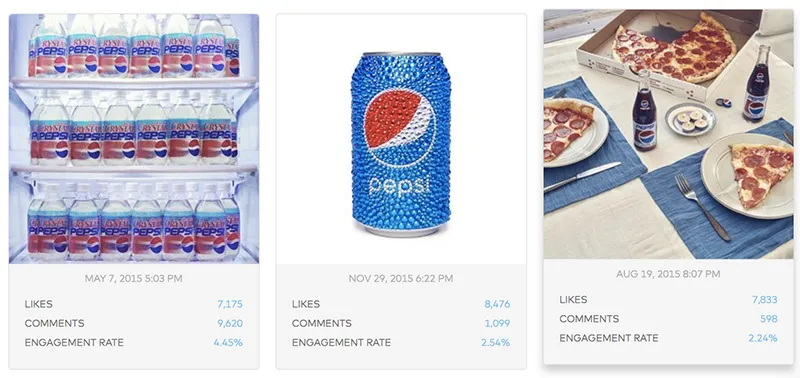Battle of the Giants: Pepsi Vs. Coca-Cola

It's a social showdown. Some great rivalries are legendary: Yankees vs. Red Sox, Orson Welles vs. William Hearst, Sega vs. Nintendo, Microsoft vs. Apple. We could spend all day listing these storied foes, but today we're focusing on perhaps one of the most iconic battles of all, Pepsi vs. Coca-Cola.
The clash of the colas dates back over 100 years, but there's a new battleground where the fight has gained modern momentum—Instagram (where else?). Pepsi and Coke are not only soda royalty but also integral to American culture in terms of recognition, consumer habits, and branding. Their ability to create aspirational brands based on customer loyalty has made them stand out not just as CPG giants but as social media titans.
The consistency with which Coke and Pepsi have built their all-encompassing brand journeys is something for the history books. They’ve masterfully leveraged all their marketing activities to create unique worlds for their consumers, centered around their core messages. This powerful branding has seamlessly translated to visual storytelling platforms like Instagram.
But when does that cease to be sufficient in today’s digital age? There comes a point where Instagram campaigns and strategies need to take on a life of their own for accounts to truly rise above the pack, regardless of their standing outside social media.
We've discussed how social media can create marketing magic, but what happens when brands have already spent decades engineering an image larger than life? On a platform as intrinsically visual and specific as Instagram, none of that previous branding counts as much. You can only go so far on the channel before it becomes necessary to develop a distinct Instagram marketing strategy.
Instagram is becoming a top priority in the marketing funnel for companies, especially with the availability of Instagram business accounts and tools like Dash Social to measure performance and ROI. Conclusion: devising a strategy is key.
With that preface in mind, let’s dive into the Instagram stats of two of America’s most iconic companies. Both evoke strong imagery that precedes their reputations, but how are they performing on the nation's favorite social channel? Let’s begin the match-up with some basic numbers.*
Pepsi Instagram: @Pepsi
Followers: 879,986
Average posts per week: 3
Average likes per post: 6,476
Average engagement rate in the past 2 years: 0.78%
Average engagement rate in the past 4 weeks: 0.64%
Pepsi's top 3 most engaged-around posts of all time:

Coca-Cola Instagram: @Cocacola
Followers: 1,871,917
Average posts per week: 3
Average likes per post: 12,389
Average engagement rate in the past 2 years: 0.70%
Average engagement rate in the past 4 weeks: 0.49%
Coca-Cola's top 3 most engaged-around posts of all time:

The important thing to note here is that while Coca-Cola has a bigger audience, Pepsi's content seems to be resonating a little more with their followers, based on each of their average engagement rates. And that goes for the last 2 years as well as within the last 4 weeks. Remember, follower count is not actually one of the performance indicators. That said, their respective highest performing posts are all from 2015 (excluding queen Selena), which tells us that their Insta glory days seem to be a thing of the past.
While Pepsi has posted 3 times in the last week, Coca-Cola's last posts are from February. In fact, they've only posted 6 times since the Holidays... And as all of our best practices materials will tell you, that isn't nearly enough.
Let's go in a little deeper into the KPIs.
The graph below illustrates the average engagement per post on each account. You can clearly see that Coca-Cola is ahead in this category. They might post less often, but when they do, there is a higher percentage of their audience that interacts with them with either a like or a comment.

This graph represents each account's weekly reach, both owned and earned. They're basically neck and neck here. While this means that Coke gets tagged more in UGC, Pepsi has the edge with their own content despite having a smaller audience, likely because they post more often.

This graphic indicates the Pepsi and Coca-Cola average weekly growth rate. Pepsi is winning that KPI by a few points even though they get tagged less. Again, probably because they are slightly more active.

Here's Pepsi's growth chart from the last week, where they added over 7k new followers at an average of 1.2k per day.

As for Coke's growth chart from the past week, we can see that they added over 12k new followers at an average of 2k per day. These numbers are higher than Pepsi's, but the ratios are lower.

After observing these results, it's pretty clear that Pepsi, while manning a smaller account than Coca-Cola, has a slight performance edge. All the KPIs point to it. That said, can you just imagine what these mega giants and absolute brand-building image pros will be able to achieve once their marketing and social departments have access to Dash Social's Predictive Vision AI.
Get ready.
__
*These numbers represent the stats at the time of publishing, but it's important to note that they are constantly fluctuating.





